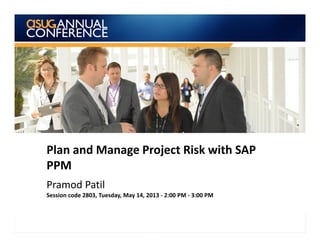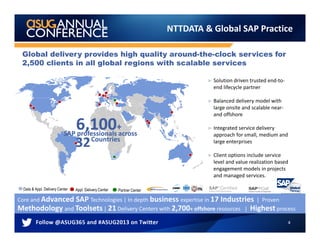2803_ASUG_AC_Plan_and_Manage_Risk_with_SAP_PPM
- 1. Plan and Manage Project Risk with SAP PPM Pramod Patil Session code 2803, Tuesday, May 14, 2013 - 2:00 PM - 3:00 PM 1
- 2. 2 LEARNING NTTDATA & Global SAP Practice Project Risk Management Use of PPM Checklist for Risk management Checklist item Dashboard & Views Implementation Challenges Reporting
- 3. 3 NTTDATA & Global SAP Practice World’s sixth largest IT Service provider & systems integrator Founded 1967 in Japan as the technology arm of the NTT Group $15B in annual revenues 60,000 professionals operating in 36 countries More than 10,000 employees in India Serving 80 of the Global Top 100 organizations
- 4. 4 NTTDATA & Global SAP Practice Appl. Delivery Center Core and Advanced SAP Technologies | In depth business expertise in 17 Industries | Proven Methodology and Toolsets | 21 Delivery Centers with 2,700+ offshore resources | Highest process Global delivery provides high quality around-the-clock services for 2,500 clients in all global regions with scalable services Data & Appl. Delivery Center â–ş Solution driven trusted end-to- end lifecycle partner â–ş Balanced delivery model with large onsite and scalable near- and offshore â–ş Integrated service delivery approach for small, medium and large enterprises â–ş Client options include service level and value realization based engagement models in projects and managed services. Partner Center SAP professionals acrossSAP professionals across 6,100+6,100+ 3232CountriesCountries SAP professionals across 6,100+ 32Countries
- 5. 5 PROJECT RISK MANAGEMENT Advance Risk identification Risk Planning Risk impact and opportunity recording Risk reasons & mitigation plan Responsibility Documentation Understanding the key figures in advance Tracking the project risk
- 6. 6 PROJECT RISK MANAGEMENT When is the Risk occurrence & mitigation required What was cause of Risk What is opportunity Who is responsible – Person, Group or Org. How much is cost impact What actions and tasks needs to be initiated When? What? Who? How? How much?
- 7. 7 PROJECT RISK MANAGEMENT Risk Identification Risk Analysis Risk Control & Reduction Risk Reporting Risk register Person responsible Description & Documents Details information Probability Impact Opportunity Status of Risk Mitigation plan Dates Detail of actions Workflows Documents Risk evaluation Project risk reporting Metrics for key indicators Region / Program level reporting
- 8. 8 RISK REGISTER Identify, analyse & categorize Evaluate and rank - Probability, impact Identify actions Forecast new probabilities, impacts Implement actions Accountability Responsibility and authorization for workflow Alerts and Indicators based on severity Planned dates for action Action and issue management
- 9. 9 PROJECT MANAGEMENT CHECKLIST ITEM Checklist to manage Risk Standard checklist items as issues Standard enhancement for additional information Checklist item dashboard as Risk dashboard Dashboard for summarization & filters
- 10. 10 PROJECT MANAGEMENT CHECKLIST ITEM
- 11. 11 CHECKLIST ITEM DASHBOARD Standard status management functionality to track the risk items. Confirmation from dashboard Threshold and alerts used for notification and indicators. Portfolio and bucket information at checklist item level.
- 13. 13 CHECKLIST ITEM DASHBOARD Checklist to manage risk in Project Action and issue management One dashboard for risk, opportunity, actions, issues
- 15. 15 CHECKLIST ITEM Basic Data tab Risk details
- 16. 16 RISK REPORTING Risk reporting Standard evaluation layout for project reporting
- 17. 17 Key indicators at portfolio item level by using metrics functionality Questionnaire to determine risk score and alerts in Project BI reporting to see risk status at region and country level Standard dashboard as individual risk register RISK REPORTING
- 19. 19 IMPLEMENTATION CHALLENGES Usability Process standardization Reporting Minimum Custom enhancement
- 20. 20
- 21. 21 THANK YOU FOR PARTICIPATING Please provide feedback on this session by completing a short survey via the event mobile application. SESSION CODE: 2803 For ongoing education on this area of focus, visit www.ASUG.com





















